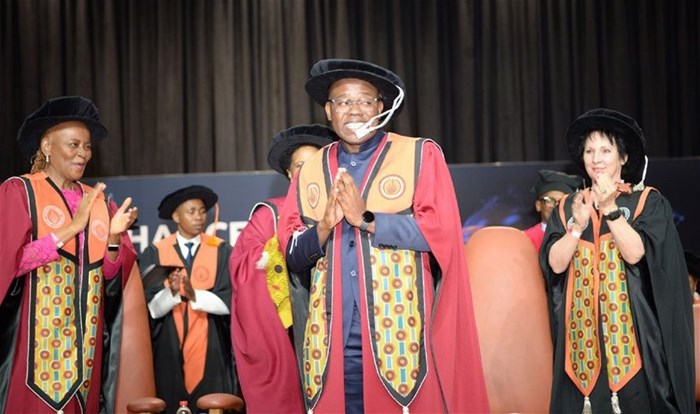
Subscribe & Follow
#AfricaMonth
Jobs
- Lecturer and Module Coordinator (Apparel Production) Pretoria
- Lecturer: Logistics Management Bellville
- Lecturer: Visual Effects (VFX) Cape Town
- Programme Coordinator: Post Graduate Department Cape Town
- Interior Design Lecturer Potchefstroom
- Lecturer: School of Humanities and Social Sciences Durban
- Buildings and Maintenance Officer Durban
- PE Campus Dean Port Elizabeth
- IT Assistant Cape Town
- x2 Lecturer / Senior Lecturer - School of Information Technology Pretoria
In the news
Prof Letlhokwa Mpedi inaugurated as the vice-chancellor and principal at UJ
The Sanlam Auditorium at the University’s Auckland Park Kingsway (APK) Campus broke into song and ululation as Prof Mpedi’s name was called. The jubilant scenes continued as he stepped onto the podium, where he gracefully accepted the baton to lead the University into a new era of education.
Prof Mpedi becomes the third vice-chancellor to take up the reins of UJ in its 18 years since the institution came into existence, following the merger between the Rand Afrikaans University (RAU), the Technikon Witwatersrand (TWR) and the Soweto and East Rand campuses of Vista University. Until his appointment, Prof Mpedi was the Deputy Vice-Chancellor: Academic (UJ), a position he was appointed to in 2021. Prior to that, he was the Executive Dean of the Faculty of Law (UJ).

“I am honoured to be leading this great university. I am ever mindful of the astonishing institution I am inheriting. In our country’s democratic history, UJ is still considered relatively young, despite the weight we hold of various historically important institutions. This is a story I want to build on as we commence with a new chapter,” said Prof Mpedi, as he acknowledged his predecessors, Prof Ihron Rensburg and Prof Tshilidzi Marwala, UJ’s first and second vice-chancellors, respectively.
“The commitment to innovation, Pan-Africanism and the emergence as a fourth industrial revolution (4IR) university has become part of our DNA. This will continue to remain our focus and ethos going forward. However, we cannot ignore the context of the world around us. Steep rises in inequality, growing divisions, pandemics, climate change and leadership crises are but a few descriptors of our current era.”
In his address, Prof Mpedi shared his vision to further position the University for the future. “As a public university at the southern end of Africa, UJ does not exist in a vacuum. It exists in and is buffeted by an environment that is marred by these social, economic and political challenges of increasing extent and complexity. There are issues in our local and national environments, such as corruption and ineptitude, that need to be addressed head-on, but equally, we are not immune from the wicked challenges of our time. Universities have a mandate that extends beyond their own walls – we have a responsibility to society to provide answers.”
Prof Mpedi pointed out that UJ has led the way in building understanding and capabilities in a changing world. And as this change accelerates, the role of technology is changing. Beyond the internet of things (IoT), artificial intelligence (AI) and robotics, for instance, there is a distinct need to co-create a purposeful and inclusive societal future, within the reality of technology and constant innovation.
“Guided by the United Nation’s (UN) Sustainable Development Goals (SDGs), UJ has already demonstrated that it is uniquely poised to combine its 4IR and education expertise to enable this future, equipping our students and the world with the knowledge tools and opportunities to solve society’s most pressing needs.”
Professor Mpedi reminded everyone in attendance of the value of approaching education through the gaze of societal impact. “Of course, doing this in isolation is not an option. I extend this invitation to the whole UJ community, including the council, senate, alumni, staff, students, unions, institutions, and allies of the university, to ensure that our strategy is impactful, and people centred.”
Related
UJ, Google partnership to boost cybersecurity skills, youth employment 3 hours UJ opens new education centre with focus on AI, VR 23 Apr 2025 Global recognition as SA wins 2024 ESG Communication Award 20 Mar 2025 University of Johannesburg students win big at Assegai Awards 2024 with powerful GBV campaign 25 Nov 2024 KFC empowers staff with nationally recognised qualifications 25 Oct 2024 UJ’s Prof Hassina Mouri first female geoscientist from Africa to lead global scientific body 26 Sep 2024













